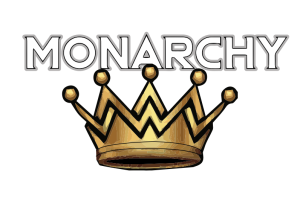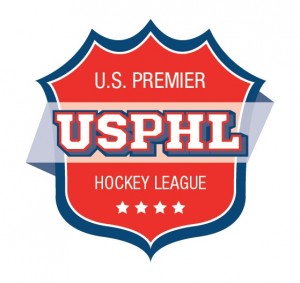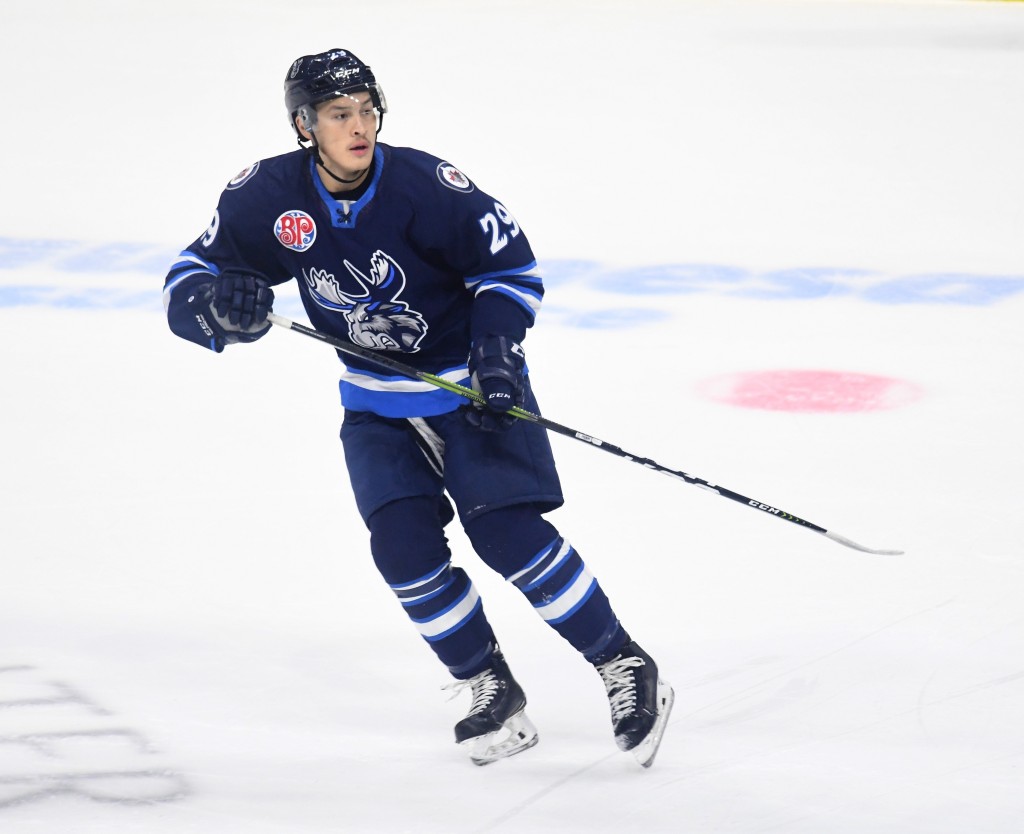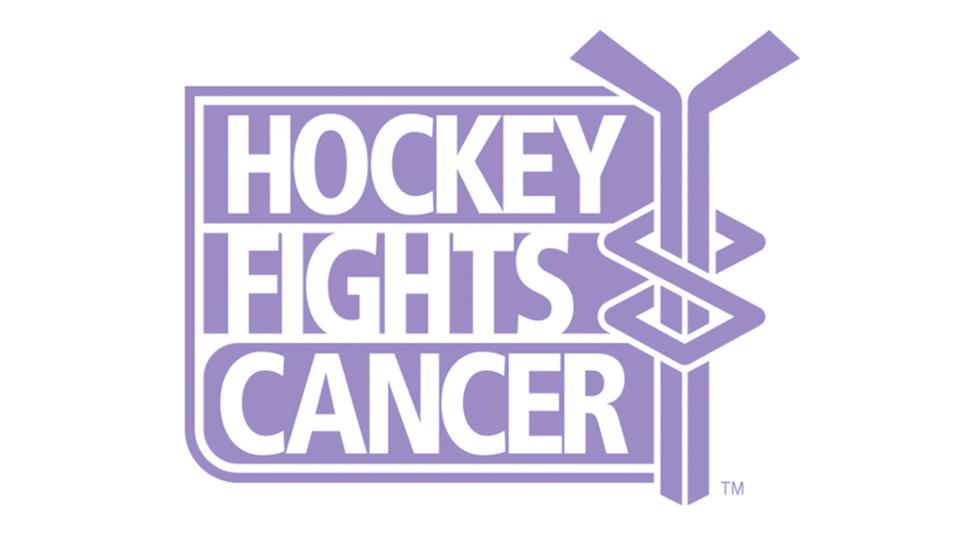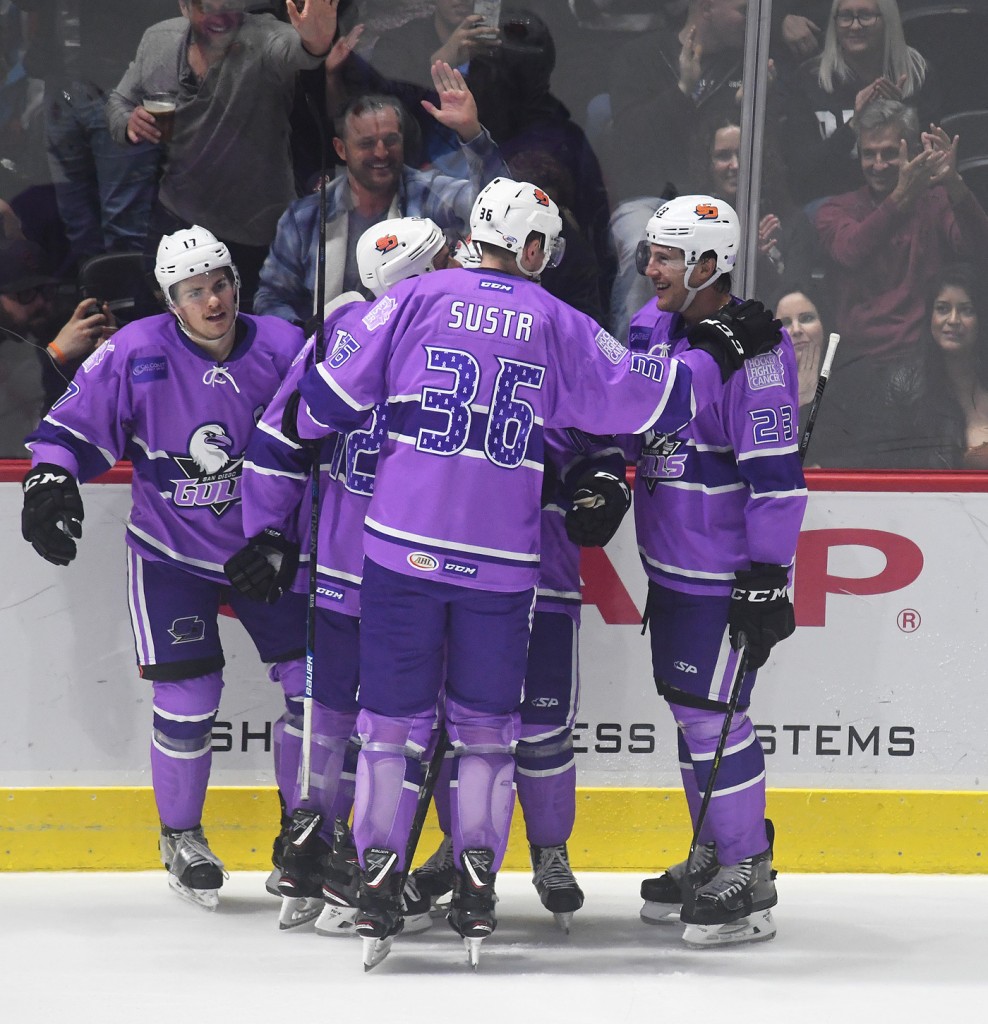After winning his own fight, former Titans star Woods joining cancer battle to help others

Former California Titans standout Justin Woods is now a professional hockey player in every sense of the word.
But there was a time when that was not so certain.
Woods, who played the 2010-11 season for the Titans’ 18U team, was diagnosed with a rare form of cancer following his freshman season at the University of Alaska-Fairbanks. He took a season off to undergo treatment before returning to finish a four-year career with the Nanooks.
“My freshman year in college, which was 2013-14, I got diagnosed with Ewing’s Sarcoma,” Woods recalled. “It’s a rare childhood cancer, soft tissue and bone cancer. I had to sit out a full year. I had nine months of chemo and one month of radiation. Luckily, ever since, I’m cancer-free. It’s quite the journey.”
Indeed so.
Woods, who had navigated stints in the North American Hockey League (NAHL) with the Fairbanks Ice Dogs and in the United States Hockey League (USHL) with the Lincoln Stars after receiving a launch into competitive tier hockey with the Titans, had just turned 20 when he received the bad news.
About 200 to 250 Americans, mostly male, are diagnosed with Ewing’s Sarcoma each year, about one-in-a-million people. Woods’ particular cancer had developed as a cyst on his right knee.
Woods admitted he was scared when he first got the news. The thought of losing a leg or even losing one’s life understandably put hockey in the back seat.
Some cancer remained after the initial surgery and doctors had to go back in and scrape more malignant tissue off the bone. Ten months of treatments followed in Seattle.
Because doctors got to the cancer early, Woods was afforded some positive thinking.
Due to the treatment regimen Woods missed out on more than just playing for the hometown Nanooks. He was unable to attend an NHL development camp with the Winnipeg Jets as a free-agent invitee in the summer 2014.
However, he got a big morale boost when the Jets sent the gear that he would have used in camp to him in Seattle as a motivating tool.
Following his return to the ice in 2015-16 with the Nanooks, during which he picked up five goals and nine points in 34 games, Woods received an invitation to the Jets’ 2016 development camp. He was able to attend this time.
It was time to put hockey back on the front burner.
During his junior season with the Nanooks, he posted 12 points in 30 games. During his senior season, he logged nine goals and 20 points in 34 games.
Overall, he collected 47 points (18 goals, 29 assists) with 105 penalty minutes in 133 games with the Nanooks.
Because of his past struggles, Woods continues to develop as a pro hockey player; the Jets remained intrigued in what his potential might be.
Woods signed with the Jacksonville Icemen in the ECHL, a secondary affiliate of the Jets, after completing his his college eligibility. He appeared in eight games for the Icemen at the tail end of the 2017-18 season, recording three goals and seven points with a plus-three rating.
He generated enough interest from those numbers to sign a professional tryout offer (PTO) with the American Hockey League’s (AHL) Manitoba Moose, Winnipeg’s top developmental affiliate, and appeared in one game with the Moose to end that season.
Now 24 and a strapping 6-foot-2, 206-pound defenseman, Woods signed an AHL contract with Moose during the offseason and earned a spot on the Jets’ Young Stars roster during preseason rookie camp.
He participated in this Moose’s AHL preseason camp but started the season in Jackson ville. He had logged seven points (three goals, four assists) in 19 games with the Icemen at the point of his AHL recall on Nov. 27.
“It’s good,” Woods said. “I started in Jacksonville. I played a lot there. That got me in pretty good shape. I was lucky enough to get called up here for however long, so I’m just trying to do my part and chip in and add to the team.”
Woods picked up an assist during his first five games with the Moose on his current assignment.
While Woods has made the most of his second chance in pursuing his dream of playing pro hockey, he hasn’t forgotten the path, sometimes filled with darkness, that brought him back into the light.
He retains close ties to others fighting this terrible disease and devotes his own time to helping patients through their own journey while battling the disease.
“I sponsor some kids at the Seattle Children’s Hospital,” Woods said. “Right now, one of my good friends is fighting cancer down in New York,. Her name is Shelley Smith (veteran ESPN reporter). She’s been fighting way longer than I have.”
Woods said the mental determination to beat the disease is as much a prescription for recovery as is all the physical treatments, some of which can place a patient at the point of near death before resurrecting them to the land of the living.
“You have your ups and downs but mostly just have a good attitude and be thankful for every day,” Woods related. “You’re going to have your bad days, your good days. But that’s all part of it. It’s just about finding that happy medium, just even keel.”
He’s taken that same philosophy back onto the ice, making the most of every opportunity wherever that may take him.
Woods said he remains grateful for the opportunity to play with the Titans.
During the 2010-11 season with the Titans, he collected eight goals and 17 points with 47 penalty minutes in 24 games.
It proved to be a launch pad to being selected to play in the 2012-13 USHL/NHL Top Prospects Game.
“You play so many games down here and there’s a lot of good competition,” Woods explained. “You go to about five big tournaments throughout the country, so I think that really prepared me for my next step up in juniors.”
And his next step in life.
Hockey Fights Cancer
This past November marked the 20th year of the NHL’s league-wide Hockey Fights Cancer initiative in which all 31 teams across the United States and Canada participated.
The Hockey Fights Cancer initiative, founded in 1998 by the NHL and NHL Players Association, unites the hockey community in support of cancer patients and their families during Hockey Fights Cancer Awareness Month.
Players, coaches, equipment managers, front office staff, corporate partners and fans provide an assist to inspire hope and courage to those who are living with, going through or moving past cancer.
The initiative has raised more than $18 million to support national and local cancer research institutions, children’s hospitals and player and local charities.
During Hockey Fights Cancer Awareness Month, every NHL team joined the hockey community’s fight against cancer by hosting its very own Hockey Fights Cancer Awareness Night — a night when players, fans, team personnel and partners could come together to raise money and awareness for this most important battle.
Lavender is the official color of the NHL’s Hockey Fights Cancer initiative.
Games featured lavender dasher boards, lavender stick tape, helmet decals and “I Fight For” cards (where fans are encouraged to fill in the name of a loved one).
Most prominent to fans watching the games, players donned specialty-themed lavender jerseys, which were available for in-game auction.
The Los Angeles Kings faced off the month with their Hockey Fights Cancer Awareness Night on Nov. 3. The Anaheim Ducks followed on Nov. 4. The San Jose Sharks hosted their special night on Nov. 17.
Twenty-one of the 31 AHL teams joined the NHL and NHLPA for its Hockey Fights Cancer initiative in 2018.
During the entire month of November every Sharks home game had a cancer-related non-profit as the beneficiary of the Sharks Foundation.
In the spirit of the campaign, the Sharks Foundation, in partnership with Kaiser Permanente, held its first-ever Board Game Night at Kaiser Santa Clara on Nov. 16. Sharks Aaron Dell, Justin Braun, Melker Karlsson and team mascot S.J. Sharkie, along with AHL San Jose Barracuda players Antoine Bibeau, Jake Middleton and Keaton Middleton, joined 50 guests comprised of pediatric outpatients and their families to play classic board games.
Dell and Bibeau, both goaltenders, took a timeout from the competition to visit in-patients in Kaiser’s pediatric unit who would not participate in the festivities.
In the Sharks’ home game against the St. Louis Blues the following night, on Nov. 17, five pediatric patients ages 7-19 stood on the ice with the Sharks starting line-up for a moment of recognition during the national anthem.
Longtime Sharks season ticket holder Cindy Cook, who recently celebrated her fifth year being cancer-free, dropped the ceremonial first puck.
In total, the Sharks Foundation donated $72,925 between five non-profits during a highly successful November of fund-raising events.
The Kings and their AHL affiliate, the Ontario Reign, also were active in raising awareness and funds during Hockey Fights Cancer themed events.
The Kings donated $500 for every home goal scored during October – a total of $4,500 – to the Amgen Breakaway from Cancer initiative.
Meanwhile, the Reign raised a total of $24,519 during its Hockey Fights Cancer Night on Nov. 3 at Citizens Business Bank Arena. Fans were able to bid on specialty jerseys worn by the team, with all proceeds being a part of the total donation.
Defenseman Kurtis MacDermid had the highest-selling jersey at $1,300, while forward Brett Sutter and defenseman Sean Walker also reached the $1000 mark.
Besides the in-game jersey auction, Ontario defensemen Daniel Brickley, Kale Clague and Chaz Reddekopp each shared their own personal ties to cancer within their families. Brickley’s father is battling colon cancer while Clague lost his grandmother to lung cancer. Reddekopp lost his father to brain cancer when he was just two.
The San Diego Gulls, the Ducks’ AHL affiliate, hosted their inaugural Hockey Fights Cancer Awareness Night on Nov. 23 when they entertained the Pacific Division rival Stockton Heat.
The Gulls wore lavender jerseys, with all proceeds raised from the post-game jersey auction donated to the American Cancer Society.
During an intermission between periods Gulls players and coaches delivered an inspirational message to fans via the video scoreboard above center ice. Head coach Dallas Eakins was the first to speak, followed by defensemen Jaycob Megna and Keaton Thompson and forward Max Jones.
All had lost a family member to the terrible disease.
Eakins lost his mother Carol to kidney cancer. She was 51.
“It’s a nasty disease and it never goes away,” Eakins told fans.
During a time out in the second period fans were asked to hold up “I Fight For” cards to represent those who have been affected by cancer in their lives. In a particularly poignant moment, a sizable percentage of the 8,004 fans in attendance held up the cards.
Eakins later addressed the media in a post-game press conference.
“Cancer is a disease that affects us all,” Eakins said. “It has affected many guys in our dressing room. If affects everyone around the world. If we can just give back and try to raise some funds to fight this nasty disease, I think we’re better for it.”
On Nov. 27, the AHL team hosted Gulls Night at Rady’s Rink at Liberty Station. All players skated with VIP (very important patients) families from Rady’s Children’s Hospital.
Fans and supporters of the hospital met the team, took photos and skated on the outdoor rink with their favorite player. Net proceeds from the event benefited the Thriving After Cancer program in the Peckham Center for Cancer and Blood Disorders at Rady Children’s.
Currently, 75 percent of children treated for cancer will become long-term survivors.
So, who do you fight for?
Photos/Phillip Brents
— Phillip Brents
(Jan. 3, 2019)






